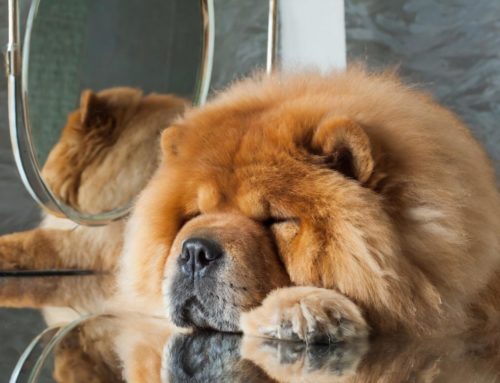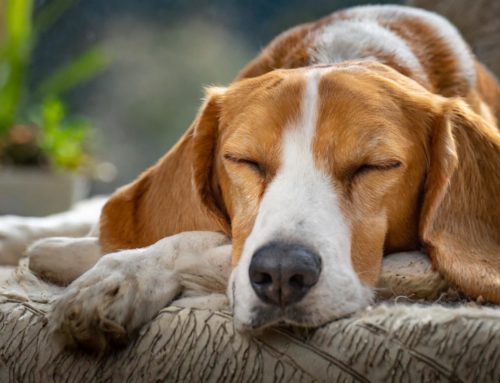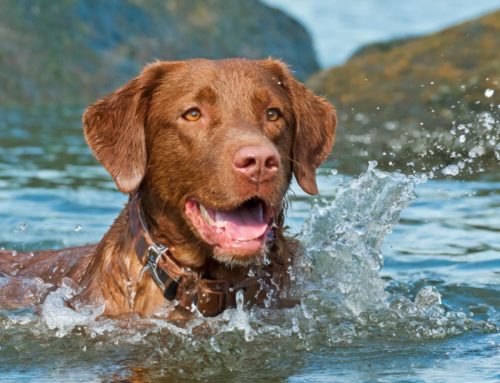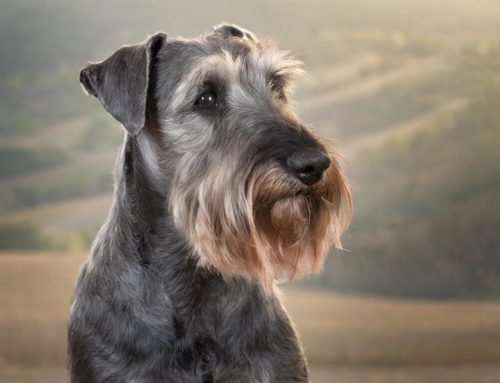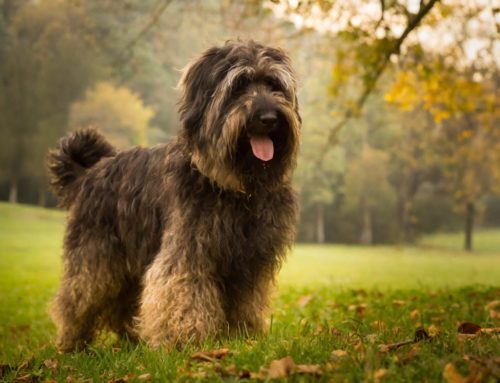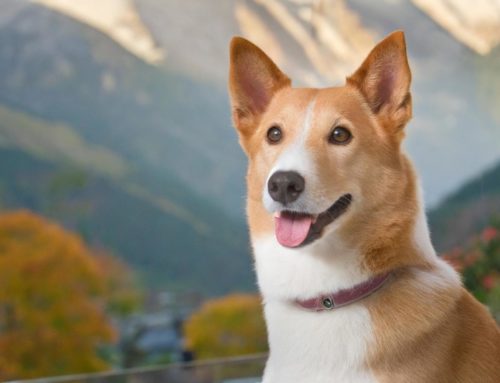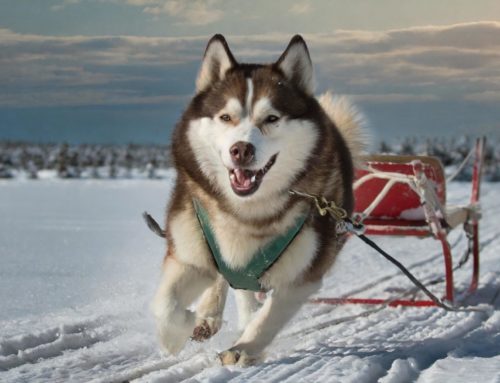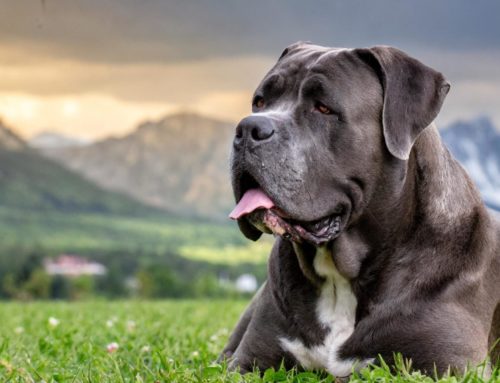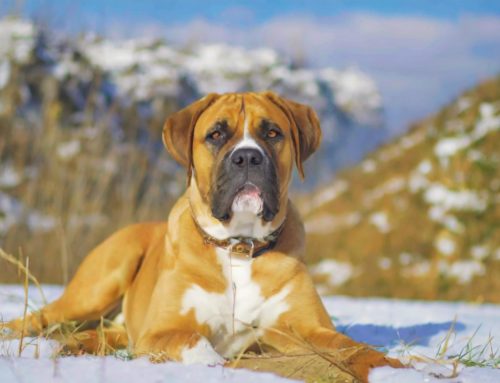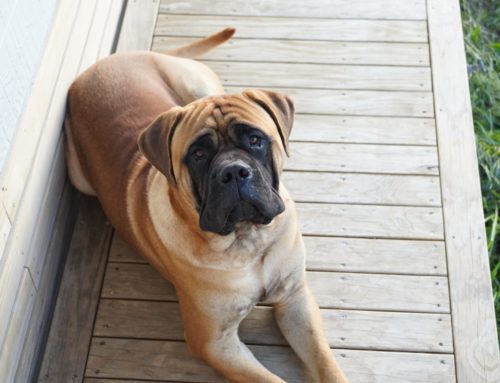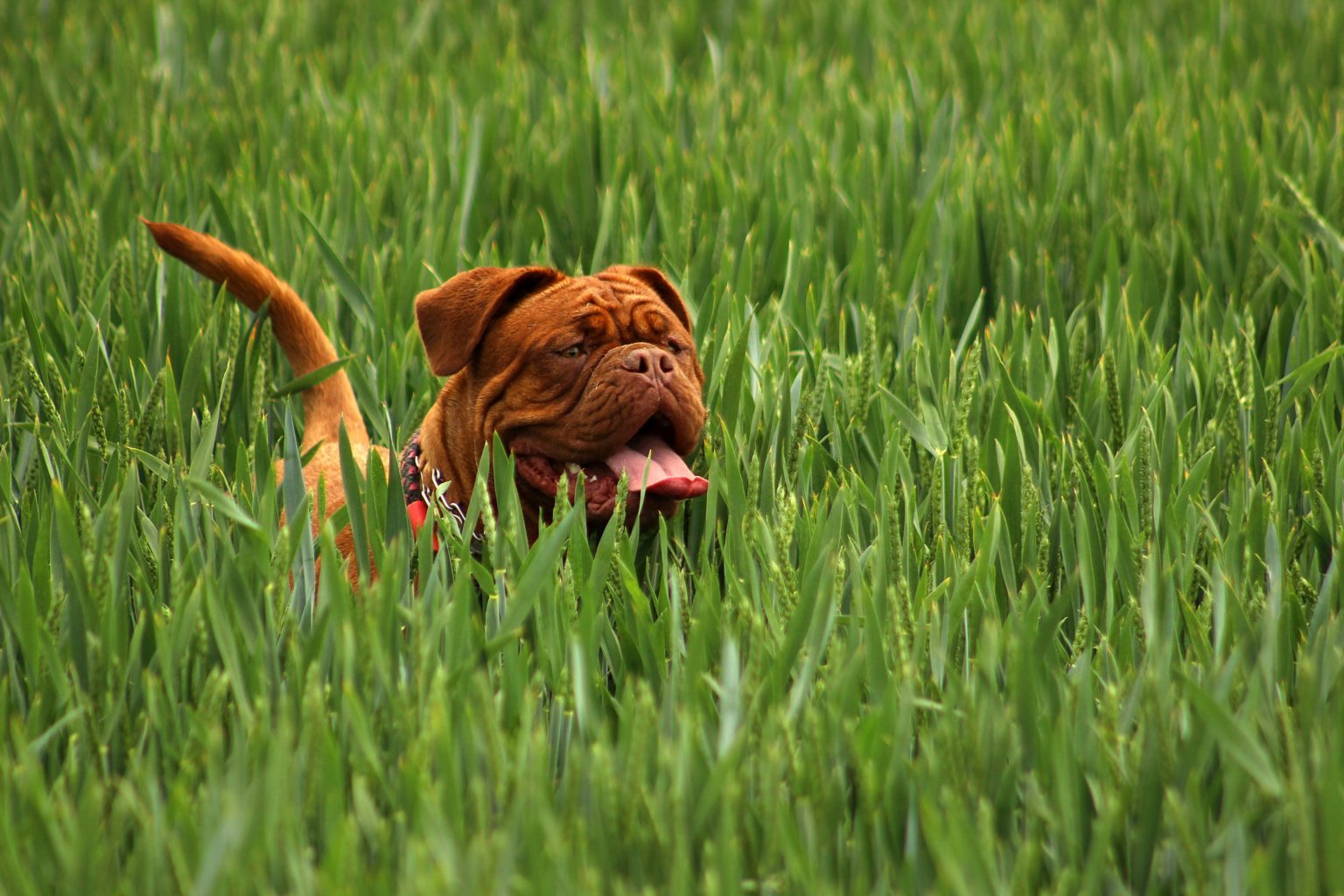
An impressive dog breed with a rich history, the Bordeaux Dog is descended from the ancient Mastiff breeds. These dogs were formerly used for taking down big game such as bears, as well as protecting homes and property. Known for its broad and muscular appearance, the Bordeaux Dog has a striking appearance with a distinctive chest and wide feet.
During World War II, the breed went through a difficult period, but was rebuilt after World War II. Thanks to the efforts of fanciers and breed associations, including the Raad van Beheer op Kynologisch Gebied, the Bordeaux Dog has regained its place in the dog world.
These dogs are known to be often kind to children and get along well with other pets, provided they are well socialised from an early age. A Bordeaux Dog puppy can be a great addition to a family, but keep in mind that due to their size and strength, they need to be raised and trained well.
The breed standard of the Bordeaux Dog emphasises a balanced character and solid build.
FCI Group 2 Pinscher and Schnauzer – Molossoid and Swiss Mountain and Cattledogs
The Bordeaux Dog, also known as the French Mastiff and belongs to the FCI Group 2: Pinschers and Schnauzers, Molossers, Mountain and Swiss Mountain Dogs.
This group includes breeds known for their strength, courage and loyalty. The Bordeaux Dog stands out for its massive build, with a broad and rather short body, and a characteristic head with a serious expression.
Known for its courage and strength, the Bordeaux Dog used to be used for guarding houses and livestock. Nowadays, he is mainly a loving family companion, known for his affection and patience with children.
However, it is important to bear in mind that, given its size and strength, the Bordeaux Dog needs good socialisation and training to ensure that it gets along well with other pets and people, including children.
The appearance and coat of these Mastiff-like breeds
These dogs are best known for their massive physique and powerful appearance. Males, or males, have a shoulder height of around 60 to 68 centimetres, while females, or females, are slightly smaller with a height of 58 to 66 centimetres. The Bordeaux Dog’s most striking feature is its broad and short muzzle, often with a distinctive wrinkled expression.
The eyes are set far apart and the dog has an expression that can be both sweet and watchful. The body is broad and muscular, with a strong chest and sturdy feet, which is why this breed used to be used for taking down big game and as a protection dog.
The coat of the Bordeaux Dog is short and close to the body. Regular grooming is necessary to remove loose hair and keep the skin healthy. When choosing a Bordeaux Dog puppy, it is important to choose a dog with a pedigree and to take into account any hereditary diseases that occur within this breed.
Hereditary conditions and diseases in the Bordeaux Dog such as elbow dysplasia
The Bordeaux Dog, unfortunately, is also predisposed to certain hereditary diseases and disorders, which require careful attention.
Here is a list of some of the most common health problems this breed can face:
- Hip dysplasia: A common condition in larger breeds, where the hip joint is not formed correctly, which can lead to arthritis and mobility problems.
- Elbow dysplasia: Like hip dysplasia, a joint disorder that can cause pain and lameness.
- Dilative Cardiomyopathy (DCM): A heart disease in which the heart is enlarged and does not work efficiently.
- Gastrointestinal disorders: this breed is at risk of gastric torsion (gastric rotation), a life-threatening condition in which the stomach tilts on its axis
- Skin problems: Includes allergies and infections, often due to wrinkles and folds in their skin.
- Aortic stenosis: A heart condition in which blood flow from the heart to the aorta is obstructed.
- Cancer: Unfortunately, this breed has a higher incidence of certain types of cancer.
- Gastric torsion: This breed is also at risk of stomach torsion
The character of the Bordeaux Dog
The Bordeaux Dog, an imposing appearance originally bred as a Bordeaux butcher’s dog, is now a much-loved pet. Despite its impressive appearance, the Bordeaux Dog is known for its loving and friendly nature, especially if well socialised from puppyhood.
These dogs are usually good with children and other pets, provided they are familiarised with them from an early age. The Bordeaux Dog has a short coat that requires occasional brushing to remove loose hairs and stay clean and dry, especially around the folds of the mouth.

The Care of the Bordeaux Dog
The care of a Bordeaux Dog, requires specific attention to ensure that these dogs remain healthy and happy. Their short coat needs regular maintenance; brushing helps remove loose hairs and keep the skin well dry and clean, especially around the folds around the mouth.
Good nutrition essential for maintaining healthy joints and a strong body. A Bordeaux Dog puppy needs a high-protein diet for its development, while an adult dog needs two meals a day. These dogs need sufficient exercise to stay healthy. Walking and playing are essential for their physical and mental well-being.
Although the Bordeaux Dog is often sweet to children, it is important to supervise during play to avoid overprotective behaviour. Good socialisation from an early age helps the Bordeaux Dog get along well with other pets and children.
Socialisation and upbringing of the Bordeaux Dog
The socialisation and upbringing of a Bordeaux Dog are crucial for developing a balanced and well-adjusted pet. These impressive dogs, known for their tendency to drool, require specific attention from puppyhood onwards.
When raising your Bordeaux Dog puppy, it is important to take into account the breed standard and its hereditary disorders. Early socialisation helps the Bordeaux Dog get along well with children and other pets.
This breed, known for its loving nature, can be protective, especially when children are playing and running with friends. It is important to supervise interactions between children and dogs to ensure nothing gets out of hand. A Bordeaux Dog must learn to be off leash and explore the world on its own, while remaining obedient to commands.
This requires proper education from an early age, where consistent training and positive reinforcement are essential.
How much experience does a Bordeaux Dog require
A Bordeaux Dog can be a great addition to the family, regardless of whether you are experienced or inexperienced as a dog owner.
These impressive, broad-built dogs are often known to be sweet to children, but it is important to consider their size and strength. Inexperienced owners in particular should be aware of the responsibility that comes with keeping such a powerful dog.
Bordeaux Dogs can learn and adapt, but they need good socialisation and consistent training from an early age.
This is often easier for experienced owners, as they already have experience in training and socialising dogs. Inexperienced owners may have more difficulty, especially when it comes to behaviour such as pulling on the lead or dealing with other dogs.
It is essential to understand that a Bordeaux Dog, like all dogs, needs attention, patience and love. They need to learn to get along well with children and other pets. Do not leave the dog unsupervised with children and make sure the dog knows it can explore the world on its own, but that it must also be obedient.
Is training necessary?
Training is absolutely necessary with this breed, known for its sweet nature and strength, requires a consistent and patient training approach from an early age. It is important to take into account the Bordeaux Dog’s natural tendencies, such as his ability to take down large prey, which can affect his behaviour.
A Bordeaux Dog puppy needs structure and guidance to grow into a well-mannered adult. This applies to both males and females. A well-socialised Bordeaux Dog generally gets along well with children and other pets, but it is important to always supervise, especially when children are playing with the dog.
Something unexpected can always happen, and it is essential that the dog learns how to react appropriately. It is also important to teach healthy habits from an early age, such as snacks just in the food bowl instead of out of hand, to avoid dominant behaviour.
Bordeaux Dogs are intelligent dogs that benefit from mental stimulation, so training should not only be physical, but also include mental challenges
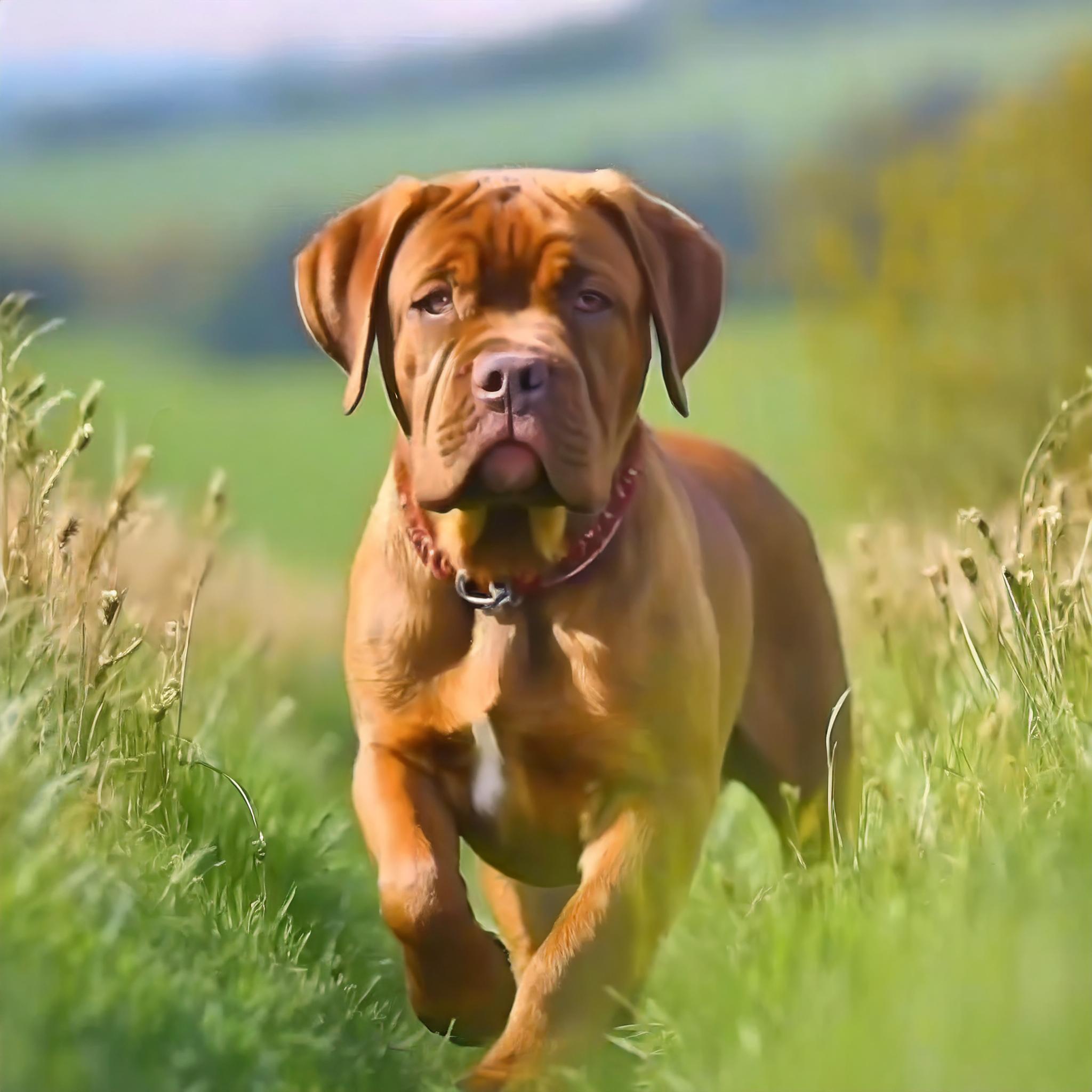
How much exercise does a Bordeaux Dog need?
A Bordeaux Dog needs about 60 minutes of exercise daily. This time can be divided into two or three shorter walks or play sessions. It is essential to strike a balance between physical activity and rest, given their large stature and risk of joint problems. Young dogs and puppies need shorter, more frequent periods of activity to avoid overexertion.
In addition to walks, mental stimulation through training and mind games is important for the Bordeaux Dog’s well-being. This not only helps control their weight and prevent health problems, but also promotes a happy and balanced life for these impressive dogs.
How is it getting along with children and other pets?
The Bordeaux Dog is known as a loving and loyal pet, often particularly gentle and patient with children. Their protective nature means they can act as a watchful guardian, especially when children are playing with their friends. However, it is important to teach both children and the dog from an early age how to interact in a safe and respectful manner.
Although the Bordeaux Dog usually gets along well with children, there may be situations where the dog feels uncomfortable or threatened. It is essential to be alert and intervene if something really seems to be going on. Make sure both children and the dog have enough space and teach children to recognise and respect the dog’s signals.
As for dealing with other pets, Bordeaux Dogs get along well with other breeds, provided they are well socialised. However, due to their size and strength, it is important to keep supervision, especially during first encounters. Socialising a Bordeaux Dog with other pets from an early age is crucial to ensure they learn to live together peacefully.
Benefits of a Bordeaux Dog
- Loyalty and Protection: Bordeaux Dogs are extremely loyal to their families and excellent guard dogs.
- Patient with Children: They are known for their patience and gentleness with children, if properly socialised.
- Quiet Temperament: Despite their size, they have a relatively calm and quiet temperament, which makes them suitable for family life.
- Little Exercise Needed: Compared to other large breeds, the Bordeaux Dog does not need extremely much exercise.
Disadvantages of a Bordeaux Dog
- Health problems: Hereditary diseases such as hip dysplasia and heart problems are common.
- Drooling: They tend to drool a lot, which means extra cleaning work.
- Short Life expectancy: Their lifespan is relatively short, often around 5-8 years.
- Costs: Costs for grooming, feeding and medical care can be high, given their size and health risks.
- Training: Bordeaux Dogs require consistent training and socialisation due to their size and strength.
How old will a Bordeaux Dog get
A breed with impressive stature and a loving nature, the Bordeaux Dog has an average life expectancy that is slightly shorter compared to some other dog breeds.
On average, a Bordeaux Dog lives to be between 5 and 8 years old. This relatively short lifespan is partly due to the size of the breed and their propensity for certain hereditary health problems, such as heart disease and joint disorders like hip and elbow dysplasia.
Price of a Bordeaux Dog
The Bordeaux Dog, also recognized as the Dogue de Bordeaux, is a majestic breed known for its imposing stature, distinctive wrinkled face, and amiable disposition. Here’s a guide to their pricing, breeds with comparable qualities, and further advice:
Cost of a Bordeaux Dog Puppy in the US:
- Expected Price Range: Anticipate spending between $2,500 and $5,000 for a puppy from a reputable source due to their significant size and somewhat uncommon status.
Price Determining Factors:
- Breeder’s Credibility: Expect higher prices for puppies from well-regarded breeders known for their champion lineage.
- Pedigree: Registered Bordeaux Dogs with the AKC command a premium over non-registered counterparts.
- Geographical Influence: Prices may escalate in regions with a costlier standard of living.
- Age Factor: Grown Bordeaux Dogs typically come at a lower price point compared to puppies.
- Purpose: Dogs bred for specific functions like guarding could have distinct pricing from those intended mainly for companionship.
Comparable Breeds Worth Considering:
For enthusiasts of the Bordeaux Dog’s grandeur, protective nature, and fidelity, here are some alternative breeds:
- Great Dane: Known for their serene disposition and towering presence, these dogs generally cost between $1,500 and $3,000. They demand slightly less room but are comparably vast.
- Neapolitan Mastiff: Esteemed for their deep loyalty and protective features, these dogs are priced from $2,000 to $4,000. They exhibit a guardian instinct akin to the Bordeaux Dog but may exhibit a more subdued demeanor.
- Mastiff Variants: Similar breeds, including the Mastiff with its rich guardian heritage, may offer an alternate choice for those attracted to the Dogue de Bordeaux’s characteristics.
Additional Guidance:
- Thorough Research: Bordeaux Dogs are sizable creatures known for drooling and potential snoring. Confirm your readiness to accommodate a dog of this magnitude.
- Breeder Interaction: Ensure a visit to the breeder’s location to meet the puppy’s progenitors, evaluating their health and behavior.
- Training & Socializing: Despite their intelligence, a stubborn streak may show. Prioritize early and consistent training and socializing.
- Activity Requirements: These dogs necessitate regular exercise to maintain fitness, yet intensive physical activities should be moderated during their growth phase.
Locating a Bordeaux Dog Breeder:
- Dogue de Bordeaux Society: This organization can be a valuable resource for connecting with esteemed breeders.
- Kennel Directories: Utilize online directories to explore Bordeaux Dog breeders within the US, reaching out directly to discuss availability and prices.
Remember: Committing to pet ownership demands dedication. Adoption offers a meaningful alternative, potentially allowing for the inclusion of a giant breed dog into your home. While finding a Bordeaux Dog might be less likely, other similar breeds or mixes might present the perfect match, all at a considerably lower adoption fee.
